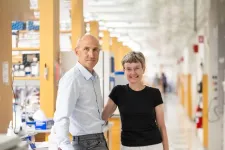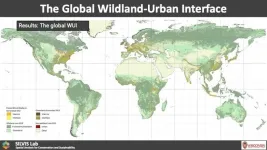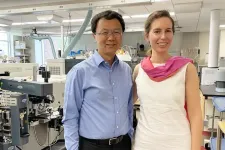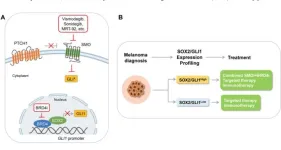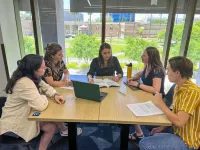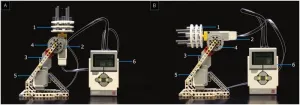(Press-News.org) You’re a poker wizard. A friend knows all about French cuisine. Another friend is a Mozart expert.
The three of you get together and share knowledge about your respective expertise. Each of you leaves learning something from the other two.
People learn a lot by sharing and exchanging information. Can computers do the same with other computers—can robots, in effect, teach other robots how to learn by sharing knowledge?
A team of researchers led by computer science Professor Laurent Itti and one of his Ph.D. students, Yunhao Ge, address this question in a paper published in May 2023 in the journal Transactions on Machine Learning Research.
They come up with a resounding answer:
Yes.
Their paper, Lightweight Learner for Shared Knowledge Lifelong Learning, describes a new approach to the growing area of machine learning (ML) research known as Lifelong Learning (LL), in which AI agents continually learn as they encounter new tasks while maintaining knowledge of previous tasks.
“It’s like each robot is teaching a class on its specialty, and all the other robots are attentive students.” Yunhao Ge.
Itti and Ge describe in the paper a tool they created, SKILL (for Shared Knowledge Lifelong Learning), in which AIs learn 102 distinct tasks – for example, categorizing tens of thousands of images of cars by model (Ferrari, Jeep, Cadillac) or flowers by species or chest X-rays by diseases.
The AIs then shared their knowledge over a decentralized communication network and eventually mastered knowledge of all 102 tasks.
“It’s like each robot is teaching a class on its specialty, and all the other robots are attentive students,” said Ge. “They’re sharing knowledge through a digital network that connects them all, sort of like their own private internet.”
Itti and Ge called their work a new direction in LL research.
Most current LL research, they explained, involves a single AI agent that learns tasks sequentially – a process that is inherently slow.
Their SKILL tool involves a set of algorithms that make the process go much faster, they said, because the agents learn at the same time in parallel. Their research showed if 102 agents each learn one task and then share, the amount of time needed is reduced by a factor of 101.5 after accounting for the necessary communications and knowledge consolidation among agents.
“Just like people, we’re trying to create AI agents that can keep learning after they discover new things.” Laurent Itti.
“Traditionally,” Itti explained, “you first collect all the data you want your AI to learn, then you train the AI to learn it. But just like people, we’re trying to create AI agents that can keep learning after they discover new things.”
Scaling up
Itti believes SKILL, the result of research funded, in part, by the Defense Advanced Research Project Agency (DARPA), is a promising starting point for advances in the field of LL.
No prior research has involved so many natural tasks, Itti and Ge said. And this is just the start.
“We believe this research, in the future, can be scaled up to thousands or millions of tasks,” Itti said.
When that happens – in just a few years, Itti estimated – LL could have the ability to transform various facets of our lives and bring humans closer to achieving a “truly connected, intelligent, and efficient global community.”
For example, in the medical field, different AI systems could specialize in learning about different illnesses, treatments, patient care techniques, and recent research, Itti said.
“We believe this research, in the future, can be scaled up to thousands or millions of tasks.” Laurent Itti.
After consolidating their knowledge, Itti and Ge explained, these AIs could serve as a comprehensive medical assistant, providing doctors with the latest, most accurate information across all areas of medicine.
Or imagine every smartphone user is a local tour guide in the city he or she is visiting. Each user takes photos and provides details about significant landmarks, stores, products, and local cuisine.
Once this data is shared across a network, every user would have an advanced digital tour guide in his or her pocket.
“In essence,” Ge said, “any profession requiring vast, diverse knowledge or dealing with complex systems could significantly benefit from this SKILL technology.”
Beyond recognition
The SKILL tool examined the ability of AIs to simply recognize what is in an image, Ge noted.
“Humans have the means of sharing information. We are now pushing that idea into the AI domain.” Laurent Itti.
“Recognition is a good starting point,” he said. “But future research will look at AIs being deployed to perform more sophisticated tasks.”
Itti and Ge said the concept of crowdsourcing – for example, online reviews of restaurants – is comparable to the idea described in their paper.
“In crowdsourcing,” Itti said, “many people tackle a piece of a problem and when the knowledge is shared, you have a solution. Now we can do the same thing with AI agents.”
“What if you, as a single person, had to relearn all of human knowledge?” Itti added. “That would be an insurmountable task. Humans have the means of sharing information. We are now pushing that idea into the AI domain.”
END
Teaching robots to teach other robots
A new study finds that by sharing knowledge with each other at the same time, AI agents can quickly learn a wider range of tasks, with applications in medicine and beyond
2023-07-19
ELSE PRESS RELEASES FROM THIS DATE:
Molecular biologists identify framework for understanding RNA editing in a disease-causing parasite
2023-07-19
As molecular biologists at Boston University and as husband and wife, Ruslan Afasizhev and Inna Afasizheva, have worked together for decades. Together, they have published dozens of papers on the mechanics of mitochondrial DNA and RNA in a single-celled, disease-causing parasite called Trypanosoma brucei. Now, years of breakthroughs have led to their latest paper published in Science, which provides a detailed look at a mystifying process called RNA editing and could potentially help treat a deadly disease.
In ...
Picturing where wildlands and people meet at a global scale
2023-07-19
Researchers led by a team at the University of Wisconsin–Madison have created the first tool to map and visualize the areas where human settlements and nature meet on a global scale. The tool, which was part of a study recently published in Nature, could improve responses to environmental conflicts like wildfires, the spread of zoonotic diseases and loss of ecosystem biodiversity.
These areas where people and wildlands meet are called the wildland-urban interface, or WUI for short. More technically, a WUI (pronounced “woo-ee”) describes anywhere that has at least one house per 40 acres and is also 50% covered by wildland ...
Using new method, study highlights physician turnover trend
2023-07-19
Using an innovative method for measuring doctor turnover, Weill Cornell Medicine researchers determined that between 2010 and 2018, the annual rate at which physicians left their practices increased by 43 percent, from 5.3 percent to 7.6 percent a year. The causes of this trend are not known, but warrant further investigation, according to the researchers.
The study, published July 11 in the Annals of Internal Medicine, also found that the first three quarters of 2020 (the start of the COVID-19 pandemic in the United States) were not associated with higher turnover. However, more data are needed to fully understand turnover trends related to COVID-19.
Whether doctors ...
Winery experiences affected by more than what is in your glass
2023-07-19
New research from the University of British Columbia's Okanagan campus has determined that enjoying a tasting at a winery goes well beyond the sip.
Professor Annamma Joy, with UBCO’s Faculty of Management, conducts research in the area of consumer behaviour and branding with a special focus on luxury brands, fashion brand experiences, wineries and wine tourism.
Dr. Joy, along with her collaborators and students, studied several Okanagan wineries over a three-year period to comprehensively document the experiences ...
Researchers use mass spectrometry to explore antimicrobial resistance
2023-07-19
Laura-Isobel McCall, Ph.D., and Zhibo Yang, Ph.D., co-principal investigators and associate professors of chemistry and biochemistry in the Dodge Family College of Arts and Sciences at the University of Oklahoma, have been awarded a prestigious R01 grant from the National Institutes of Health for their project, “Novel single-cell mass spectrometry to assess the role of intracellular drug concentration and metabolism in antimicrobial treatment failure.”
“Our project builds upon Dr. ...
Novel therapeutic strategy against melanoma: combined targeting of hedgehog signaling and BRD4
2023-07-19
“This evidence strengthens the relevance of the findings by Pietrobono et al., shedding light on the potential application of SMO inhibitors in concert with BRD4 inhibitors.”
BUFFALO, NY- July 19, 2023 – A new editorial paper was published in Oncotarget's Volume 14 on May 26, 2023, entitled, “Combined targeting of HEDGEHOG signaling and BRD4 as a novel therapeutic option against melanoma.”
The Hedgehog-GLI (HH/GLI) pathway is aberrantly activated in several types of cancer. Canonical HH/ GLI pathway is triggered by binding of HH ligands to the twelve-pass transmembrane receptor Patched 1 (PTCH1), which retrieves its inhibition ...
Large study finds small associations between systemic inflammation and later dementia
2023-07-19
A study of data from about 500,000 people in the UK Biobank has uncovered small but statistically significant associations between signs of systemic inflammation and later risk of dementia. Dr. Krisztina Mekli of The University of Manchester, UK, and colleagues present these findings in the open-access journal PLOS ONE on July 19, 2023.
Millions of people around the world have Alzheimer’s disease or other types of dementia, and researchers are working to tease out the complex mechanisms behind these conditions. Prior research has suggested that inflammation—activation of the body’s innate immune system—may ...
STEM instructors who are women drive disclosure of concealable stigmatized identities to undergraduates
2023-07-19
Women working as STEM instructors are more likely than men in the same profession to disclose to their undergraduate students identities which could carry stigma, such as depression or growing up in a low-income household. In the new study, published July 19, 2023 in the open-access journal PLOS ONE, Carly Busch of Arizona State University, USA, and colleagues suggest that these decisions to disclose may be in order to act as role models for students.
Concealable stigmatized identities (CSIs) are identities that ...
Researchers used a LEGO robotics kit as a cheap, effective way to purify self-assembling DNA origami
2023-07-19
Article URL: https://journals.plos.org/plosone/article?id=10.1371/journal.pone.0283134
Article Title: Gradient-mixing LEGO robots for purifying DNA origami nanostructures of multiple components by rate-zonal centrifugation
Author Countries: USA
Funding: The research in Hariadi lab was supported by the National Institutes of Health Director’s New Innovator Award (1DP2AI144247), National Science Foundation SemiSynBio II (2027215), and Arizona Biomedical Research Consortium (ADHS17-00007401). The funders had no role in study design, data collection and analysis, decision to publish, or preparation of the manuscript. END ...
A 300,000 year-old double-pointed wooden stick was produced by Middle Pleistocene humans using sophisticated woodworking techniques and was likely used for throwing during hunts
2023-07-19
Article URL: https://journals.plos.org/plosone/article?id=10.1371/journal.pone.0287719
Article Title: A double-pointed wooden throwing stick from Schöningen, Germany: Results and new insights from a multianalytical study
Author Countries: UK, Germany
Funding: T.T. and this project are funded by the Deutsche Forschungsgemeinschaft (DFG, German Research Foundation) – project number 447423357. https://www.dfg.de/. The project is further funded by the Lower Saxony Ministry for Science and Culture, with funds from the Future Lower Saxony Programme of the Volkswagen Foundation – project ...
LAST 30 PRESS RELEASES:
Black soldier fly larvae show promise for safe organic waste removal
People with COPD commonly misuse medications
How periodontitis-linked bacteria accelerate osteoporosis-like bone loss through the gut
Understanding how cells take up and use isolated ‘powerhouses’ to restore energy function
Ten-point plan to deliver climate education unveiled by experts
Team led by UC San Diego researchers selected for prestigious global cancer prize
Study: Reported crop yield gains from breeding may be overstated
Stem cells from human baby teeth show promise for treating cerebral palsy
Chimps’ love for crystals could help us understand our own ancestors’ fascination with these stones
Vaginal estrogen therapy not linked to cancer recurrence in survivors of endometrial cancer
How estrogen helps protect women from high blood pressure
Breaking the efficiency barrier: Researchers propose multi-stage solar system to harness the full spectrum
A new name, a new beginning: Building a green energy future together
From algorithms to atoms: How artificial intelligence is accelerating the discovery of next-generation energy materials
Loneliness linked to fear of embarrassment: teen research
New MOH–NUS Fellowship launched to strengthen everyday ethics in Singapore’s healthcare sector
Sungkyunkwan University researchers develop next-generation transparent electrode without rare metal indium
What's going on inside quantum computers?: New method simplifies process tomography
This ancient plant-eater had a twisted jaw and sideways-facing teeth
Jackdaw chicks listen to adults to learn about predators
Toxic algal bloom has taken a heavy toll on mental health
Beyond silicon: SKKU team presents Indium Selenide roadmap for ultra-low-power AI and quantum computing
Sugar comforts newborn babies during painful procedures
Pollen exposure linked to poorer exam results taken at the end of secondary school
7 hours 18 mins may be optimal sleep length for avoiding type 2 diabetes precursor
Around 6 deaths a year linked to clubbing in the UK
Children’s development set back years by Covid lockdowns, study reveals
Four decades of data give unique insight into the Sun’s inner life
Urban trees can absorb more CO₂ than cars emit during summer
Fund for Science and Technology awards $15 million to Scripps Oceanography
[Press-News.org] Teaching robots to teach other robotsA new study finds that by sharing knowledge with each other at the same time, AI agents can quickly learn a wider range of tasks, with applications in medicine and beyond
